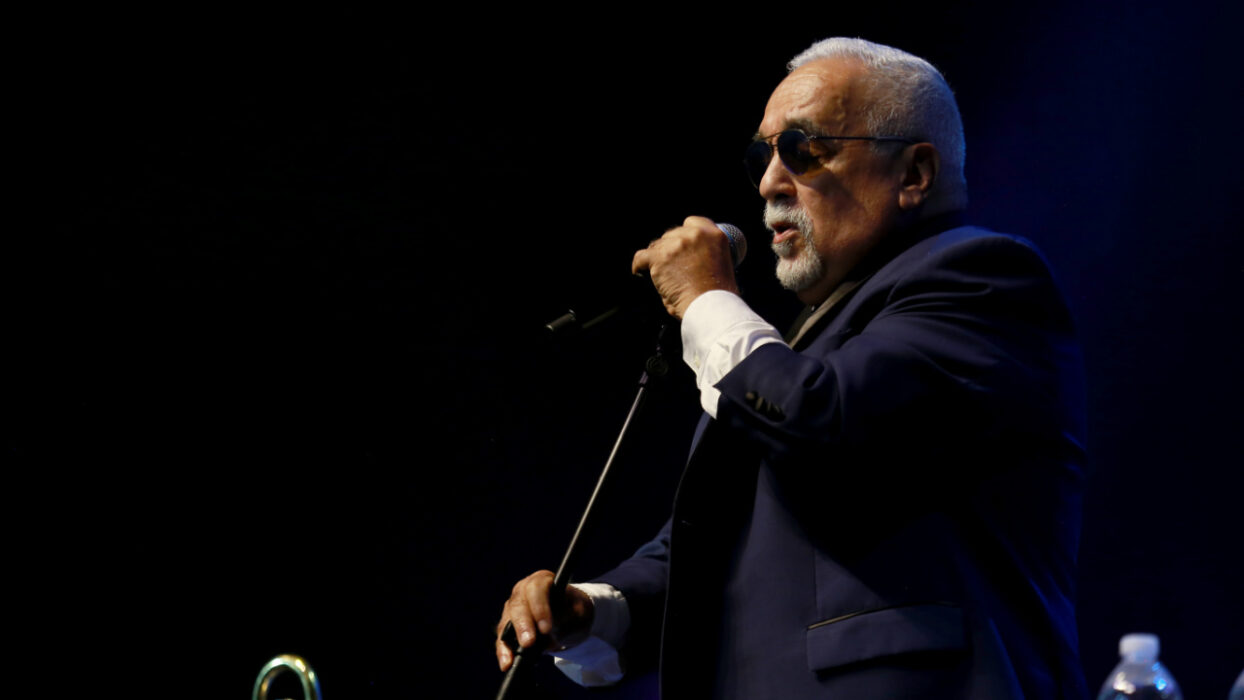
THE Ultimate Latino Protest Song Playlist You’ll Want to Blast Right Now
Los Angeles is in protest mode again, and Latino protest songs are marching right alongside us.
As thousands of Angelenos hit the streets to stand up to ICE raids that targeted schools, businesses, and homes, the city reminded the world why it’s always been a capital of resistance. According to reporting by Jorge Rodríguez-Jiménez, the most viral moment came when a TikTok video captured parents fleeing an elementary school graduation in fear of helicopters and immigration agents overhead. That moment didn’t just trend—it burned into our collective memory.
And if history tells us anything, it’s that soundtracks rise from moments like this.
Across Latin America and the diaspora, artists have always wielded music as a weapon. Protest songs are how we document our struggle, express our rage, and remind each other that we’re not alone. From salseros to rappers to cumbia punks, we’ve been singing truth to power across generations.
So whether you’re headed to the next protest or just need to feel understood—these Latino protest songs deserve a place on your playlist.
“#Sin Mexicanos” by Adriel Favela, Danny Felix, Octavio Cuadras & Giovanny Ayala: A corrido for the invisible backbone of America
Released in the thick of immigration crackdowns and protests, “#Sin Mexicanos” doesn’t tiptoe around the issue—it stomps on it. With the line “el día que falten los mexicanos, aquí en el gabacho se van a dar cuenta” (“the day Mexicans are gone, people here in the U.S. will finally realize it”), the song turns into both tribute and threat. It’s corrido, protesta, and poesía rolled into one. According to the artists, this anthem gives voice to the immigrant workers who sustain the country but rarely get credit. Their message? If we vanish, the system collapses. Period.
“We Are Mexico” by Becky G: A clapback turned anthem
Becky G’s “We Are Mexico” dropped after Trump’s infamous 2016 comments about Mexican immigrants. And she did not hold back.
“Talking in Spanglish, en Español… If you don’t know, now you know, we are Mexico,” she sings.
The track is both personal and collective, chronicling the grind of immigrant families while proudly repping la cultura. The song makes it clear that “hard work, double time” is the real Latino story—regardless of what anyone in office has to say.
La Santa Cecilia’s “El Hielo (ICE)” humanizes the headlines
This one hits especially hard right now. La Santa Cecilia’s “El Hielo (ICE)” follows three undocumented immigrants—Eva, Jose, and Marta—through everyday moments in their lives.
The lyrics capture the constant fear ICE instills, even as people try to just live. “Eva passing the rag over the table… Taking care that everything shines like a pearl. Don’t let it be that she accuses her of being illegal.”
This isn’t abstract. It’s real.
“Afilando Los Cuchillos” by Residente, iLe & Bad Bunny: Puerto Rico’s protest soundtrack
When Puerto Ricans took to the streets in 2019 to oust Gov. Ricardo Rosselló, this song was their war cry. According to HipLatina, it echoed across protests like a battle hymn.
“You are a corrupt man who takes corrupt advice,” spits Residente.
From iLe’s haunting vocals to Bad Bunny’s searing verses, “Afilando los Cuchillos” sharpened resistance into pure art—and proved that protest can topple a government.
Kids in the Cages – The Neighborhood Kids made it raw, loud, and unforgettable
The Neighborhood Kids—a conscious hip-hop band made up of Verde, Amon the MC, Niko Rosy, Gatoz Locoz, and DJ JG—aren’t mainstream yet, but their message is urgent. Their song “Kids in the Cages” hits like a punch to the chest.
They rap against abuse, systemic racism, ICE detentions, and police violence. Their entire ethos is rooted in awareness, according to their official bio, and it shows. No metaphors here. Just truth.
“Somos Más Americanos” by Los Tigres del Norte: History with a corrido beat
“Who is the invader here? I am a foreigner in my land.”
Los Tigres del Norte have always been historians with accordions, but this track goes full revisionist truth-teller. As cited by HipLatina, “Somos Más Americanos” flips the script on U.S. immigration narratives by reminding listeners that much of the U.S. Southwest was once Mexico.
It’s protest through storytelling—and it slaps.
“Shock (Arizona)” by Ana Tijoux: The call that keeps calling
Originally written to support Chilean student protests in 2011, Ana Tijoux’s “Shock” evolved a year later to address anti-immigrant policies in Arizona. The updated version came with a new video, louder rage, and sharper lyrics.
According to HipLatina, Tijoux repeats: “To the sound of a single chorus, we will march with the tone… with the conviction that the thieving stops!”
It’s a classic for a reason.
Latino protest song meets dance floor: “La Vida es un Carnaval” (Bomba Estéreo Remix)
Leave it to Bomba Estéreo to flip an Afro-Cuban classic into a global celebration of joy as resistance. According to Alt.Latino, Li Saumet and Simón Mejía add Afrobeat, reggaetón, and even a cumbia breakdown to Angelique Kidjo’s powerhouse reimagining of Celia Cruz’s “La Vida es un Carnaval.”
This remix might not be a traditional protest song, but its roots scream resilience. Play it loud. Dance through the pain.
“No Es Mi Presidente” by Taina Asili: The rejection is bilingual
Nuyorican singer and activist Taina Asili released this bilingual protest anthem in direct response to Trump’s presidency. It doesn’t mince words:
“He is not my president / He does not represent the voice of my people.”
It’s not just a protest song—it’s a refusal.
“Voto Latino” by Molotov: Voting is resistance
Mexico’s Molotov has never been known for subtlety. “Voto Latino,” from their landmark album ¿Dónde Jugarán Las Niñas?, is a raw reminder of the power of political participation.
It doesn’t just urge you to vote—it dares you to give a damn. It’s brash, loud, and unafraid.
“The Demagogue” by Lila Downs: Fearless shade
Lila Downs wrote this one ahead of the 2016 election, and it aged like a warning we didn’t listen to.
As HipLatina notes, she draws a straight line from Trump to historical tyrants: “The earth trembles with these names—Mussolini, Adolph Hitler, Pinochet…”
And in case there’s any doubt, she sings: “NO A ESE MURO.”
“Pan Pan” by Ani Cordero: Borinquen has awoken
Ani Cordero didn’t just write a protest song—she made a statement. According to Alt.Latino, Cordero said: “‘Pan Pan’ was written out of frustration with corruption in Puerto Rico… Borinquen has awoken and it’s beautiful.”
The track is heavy on percussion, pride, and protest. It deserves to be blasted at every rally.
“El Rebelión” by Joe Arroyo: A salsa that teaches history
Afro-Colombian legend Joe Arroyo turned salsa into resistance. “El Rebelión” recounts the story of a Black slave in Cartagena who stood up against his master for hitting his wife.
“And you can still hear him yelling at the gates: Don’t hit my Black woman.”
According to HipLatina, it’s become one of the most iconic Afro-Latino protest songs ever made.
“Pa’l Norte” by Calle 13 and Orishas: Borders don’t belong in music
This track is about migration, survival, and the grit it takes to move forward. “Pa’l Norte” speaks to every immigrant who’s ever crossed a line—literal or symbolic.
Billboard called it “a timely and necessary note on belonging.” And with Calle 13 behind the mic, every bar hits like a sermon.
“Despierta” by Snow Tha Product: A wake-up call for Latinos
“If they do not wake up soon the chamuco will take us.”
Snow Tha Product isn’t here for performative wokeness. “Despierta,” according to HipLatina, is a rallying cry for Latinos to unite and pay attention—to politics, to division, and to their own power.
It’s fast, it’s fire, and it’s facts.
“Dinosaurios” by Charly García: Old regimes don’t scare us
Released in 1983, “Dinosaurios” is Argentine rock legend Charly García’s response to the country’s military dictatorship. The “dinosaurs” are the men in power—and the message is clear: their extinction is near.
Still relevant. Still rebellious.
“Desapariciones” by Rubén Blades: Salsa with a conscience
This isn’t your tía’s salsa playlist.
“Desapariciones,” as reported by HipLatina, tells the haunting stories of people who vanish at the hands of government repression. Every verse is a new face. A new loss. A new demand for accountability.
It’s one of Rubén Blades’ most powerful legacies.
“Ojalá” by Silvio Rodríguez: A wish wrapped in revolution
Cuban nueva trova singer Silvio Rodríguez didn’t write “Ojalá” as a love song. Not really. The lyrics, layered with poetic fury, are aimed at someone in power.
“Ojalá que se te acabe la mirada constante,” he sings—“I hope you lose your constant gaze.”
As NPR notes, this song holds deep meaning in political movements throughout Latin America.
“Canción Protesta” by Aterciopelados: Say it loud, say it proud
Colombian rock band Aterciopelados name-drop their protest heroes here—Mercedes Sosa, Bob Marley, Victor Jara, Joan Baez—and remind us that singing against the system is its own form of resistance.
“Another protest song sounds,” they sing. “But don’t call it a terrorist.”
It’s protest with poetry—and guts.
“Calice” by Chico Buarque: Whispered rebellion from Brazil
Sometimes, protest hides in metaphors to survive. Chico Buarque’s “Calice” (“Shut up”/“Chalice”) is one of the most legendary examples.
As featured in NPR’s protest song list, the track was censored repeatedly during Brazil’s dictatorship. But its power only grew.
It’s a slow burn of defiance.
“Un Derecho de Nacimiento” by Natalia Lafourcade & Carla Morrison: Soft vocals, strong message
Finally, “Un Derecho de Nacimiento” is the kind of protest song that feels like a lullaby but lands like a punch. It emerged from Mexico’s #YoSoy132 student movement and remains a reminder that justice is our birthright.
Lafourcade and Morrison’s harmonies don’t whisper—they testify.
These songs don’t just reflect resistance. They amplify it.
So whether you’re facing ICE helicopters or singing to your ancestors—crank these up. Protest has a sound, and it’s ours.




